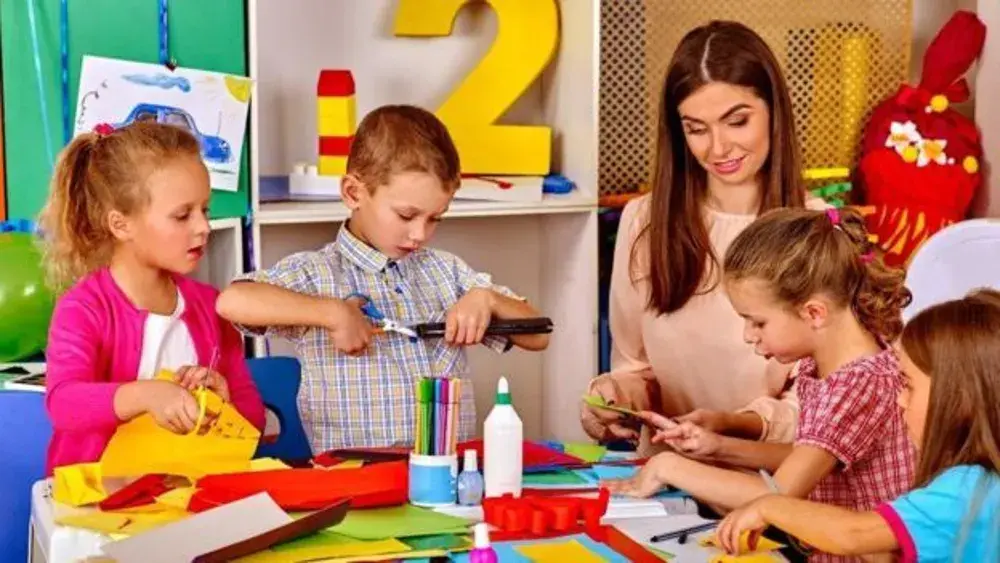Good Habits for Nursery Class

source: ywcanwil
Good Habits for Nursery Class
The early years of a child’s life are crucial for developing good habits that shape their future. As nursery teachers, we have the incredible opportunity to guide and nurture young minds, instilling in them the values and behaviors that will lay the foundation for lifelong success. In this blog, we will explore a range of essential good habits for the nursery class and discuss effective strategies to teach and demonstrate these habits to children.
In the nursery classroom, cultivating good habits sets the stage for lifelong success. This blog explores essential good habits for young learners and effective teaching strategies. Discover how Vidhyanidhi Education Society’s Nursery Teachers’ Training Course empowers educators to instill these habits in children, creating a solid foundation for their holistic development.
Table of Content
- Personal Hygiene
- Following Instructions
- Sharing and Taking Turns
- Respect for Others
- Emotional Regulation
- Responsibility
- Healthy Eating Habits
- Punctuality
- Listening Skills
- Organization
- Kindness and Empathy
- Environmental Awareness
- Safety Awareness
- Positive Communication
- Problem-Solving
- Mindfulness and Relaxation

source: images.kaplanco
Join us as we delve into the world of positive habits and their impact on young learners’ holistic development. Following are some Good Habits for Nursery Class :
Personal Hygiene:
Teaching children good personal hygiene habits is vital for their health and well-being. Demonstrate and encourage routines such as handwashing before meals, covering their mouth while coughing or sneezing, and proper dental care. Use age-appropriate resources and interactive activities to make learning about hygiene enjoyable and memorable.
Following Instructions:
Nursery class is an ideal time to help children develop listening skills and the ability to follow instructions. Establish clear expectations and provide simple, step-by-step instructions. Utilize visual cues, such as pictures or charts, to aid comprehension. Praise and reward children when they demonstrate their ability to follow instructions.

source: noisyplanet
Sharing and Taking Turns:
Teaching children the importance of sharing and taking turns fosters empathy, cooperation, and social skills. Encourage collaborative activities that require sharing, such as group games or art projects. Use positive reinforcement to acknowledge and appreciate children’s efforts to share and take turns.
Respect for Others:
Promoting respect for others is crucial in nurturing a harmonious and inclusive nursery classroom. Teach children to value and respect their peers, teachers, and the diverse cultures and backgrounds within the class. Model respectful behavior and incorporate activities that celebrate diversity and promote understanding and acceptance.
Emotional Regulation:
Helping children understand and manage their emotions is essential for their social and emotional development. Teach them techniques such as deep breathing or using “calm-down” corners. Encourage open communication and provide a supportive environment where children feel safe expressing their feelings.

source: i.pinimg
Responsibility:
Fostering a sense of responsibility in nursery children encourages independence and accountability. Assign age-appropriate tasks, such as keeping their belongings organized or caring for classroom materials. Recognize and appreciate their efforts, empowering them to take ownership of their actions.
Healthy Eating Habits:
Nurture healthy eating habits by introducing a variety of nutritious foods and educating children about the benefits of a balanced diet. Engage them in hands-on activities, such as growing and preparing fruits and vegetables, and encourage positive mealtime behaviors, like eating together and trying new foods.
Punctuality:
Teaching children the value of punctuality sets the stage for good time management skills in the future. Establish consistent routines and reinforce the importance of being on time. Use visual aids, such as clocks or timers, to help children understand the concept of time and develop a sense of punctuality.

source: images.theconversation
Listening Skills:
Teach children the importance of active listening by engaging them in listening activities, such as storytelling or audio recordings. Encourage eye contact, focused attention, and respectful responses to enhance their listening skills.
Organization:
Help children develop organizational skills by providing designated spaces for their belongings, such as cubbies or folders. Teach them how to tidy up after activities and model organization through a well-structured and orderly classroom environment.
Kindness and Empathy:
Promote kindness and empathy by incorporating activities that encourage children to understand and care for the feelings of others. Teach them to use kind words, offer help, and show compassion towards their peers and the wider community.

source: littlemeadows
Environmental Awareness:
Instill a sense of environmental responsibility by teaching children about recycling, conserving resources, and respecting nature. Engage them in activities like gardening, nature walks, or creating crafts using recycled materials to develop an understanding of their role in protecting the environment.
Safety Awareness:
Educate children about basic safety practices, such as road safety, fire safety, and personal safety. Teach them how to identify and respond to potential dangers, empowering them to make safe choices and seek help when needed.
Positive Communication:
Encourage children to express themselves positively and respectfully through effective communication. Teach them active listening, using polite words, and resolving conflicts peacefully. Model positive communication and provide opportunities for open discussions in the classroom.
Problem-Solving:
Equip children with problem-solving skills by engaging them in age-appropriate challenges and puzzles. Encourage critical thinking, creativity, and perseverance as they tackle problems and find solutions independently or collaboratively.

source: thoughtco
Mindfulness and Relaxation:
Introduce mindfulness and relaxation techniques to help children manage stress and enhance their emotional well-being. Teach them simple breathing exercises, guided visualizations, or yoga poses to promote self-awareness, relaxation, and emotional balance.
By integrating these additional good habits into the nursery classroom and teaching them effectively, you create a supportive and nurturing environment that sets children up for success in all aspects of their lives.
Through Vidhyanidhi Education Society’s Nursery Teachers’ Training Course, you will gain a deeper understanding of these good habits and learn practical strategies to incorporate them into your daily teaching practice. Join us on this journey to empower young learners with the skills, values, and habits that will shape their future. Together, let’s nurture a generation of responsible, compassionate, and well-rounded individuals.
At Vidhyanidhi Education Society, our Nursery Teachers’ Training Course covers these essential good habits and provides effective strategies for teaching and reinforcing them in the nursery classroom. Our experienced trainers guide educators on how to create a positive learning environment that promotes the development of these habits while ensuring the holistic growth of young children.
Together, let’s foster a nurturing and empowering nursery classroom, where good habits become ingrained in young children’s lives. Join Vidhyanidhi Education Society
For More details Call / Whatsapp us at +919869546913 / +919869866277
For Downloading the brochure click here
FAQs
How to teach math’s in nursery class?
Teach math’s in nursery class through the introduction of pre-math concepts using real-life objects, counting games, use of Manipulatives, and visual aids. Make it playful and interactive.
What skills do you need to be a nursery teacher?
Skills needed to be a nursery teacher include patience, creativity, communication, empathy, organization, adaptability, and a passion for early childhood education
What qualifications do you need to become a preschool teacher?
It is mandatory for candidates to have completed their 12th standard and be at least 18 years old.
How can i become a nursery teacher?
To become a nursery teacher, register yourself at Vidhyanidhi Education Society for their worldly acclaimed Nursery Training Programs that guarantee high-ranging prospects.




